- Home
- Kim Newman
The Man From the Diogenes Club Page 48
The Man From the Diogenes Club Read online
Page 48
‘People run irregularly too,’ said Harry, reasonably. ‘Even – no, especially – Talents.’
Richard was piqued. His watch was no ordinary timepiece. His father had inherited it from his grandfather, who had sat with Mycroft Holmes on the first Ruling Cabal. Geoffrey Jeperson had carried the watch all through the War. The Captain, having supervised arrests in a death camp, had been checking the time when he and a large-eyed, hollow-bellied child noticed one another. The watch brought them together. The boy who would become Richard Jeperson reached for the bauble, taking it reverentially when the Captain, on instinct, trusted it to him. He had solemnly felt its weight, listened to its quiet tick, admired its Victorian intricacy through a panel in the face. Inside gears and wheels were tiny fragments of unknown crystal, which sparkled green or blue in certain light. The roman numerals were lost in tiny engravings of bearded satyrs and chubby nymphs.
Those first ticks were where Richard’s memory began. Before now, the watch had never betrayed him.
If Jeperson’s watch wasn’t to be trusted, what else in the life furnished for him by the Diogenes Club was left? The watch wound with a tiny key, which was fixed to the chain – it could also stop the mechanism, and Richard did so. If the watch could not run true, it should not run at all. He felt as if a pet had died, and he’d never had pets. He unhooked the chain and wondered if he’d ever wear it again. He slipped watch and chain into a pocket and handed back the incident form.
Arnold, who obviously had no trouble with his watch – a railway watch, as much a part of the Scotch Streak as the wheels or the windows – announced that supper was served. According to the train clock, it was nine o’clock precisely.
Harry reset his watch and clock against the train time. He made a note in his folder.
‘I foresee you’ll be at that all night,’ said Annette. ‘Without using a flicker of Talent. It’s Sod’s Law.’
Harry smiled without humour, not giving her an argument.
It hit Richard that something had gone on between Harry Cutley and Annette Amboise, not just an investigation into a Puma Cult. Harry took teasing from her he wouldn’t from anyone else. He sulked like a boy when she paid attention elsewhere. She’d told Richard not to underestimate the Most Valued Member.
Now, in a way that annoyed him, he was jealous.
‘Should we sample the Scotch Streak fare?’ said Annette. ‘In Kilpartinger’s day, the cuisine was on a par with the finest continental restaurants.’
‘I doubt British Rail have kept up,’ said Harry. ‘It’ll be beef and two veg, pie and chips or prehistoric bacon sarnies.’
‘Yum,’ said Magic Fingers. ‘My favourite.’
‘Come on, boys. Be brave. We can face angry spirits, fire demons, Druid curses and homicidal lunatics. A British Rail sandwich should hold no horrors for us. Besides, I’ve seen the menu. I rather fancy the quail’s eggs.’
Annette led them to the dining carriage. Wood-panel and frosted-glass partitions made booths. Tables were laid for two or four.
As he passed under the lounge clock, Richard looked up. For a definite moment, he saw a face behind the glass, studded with bleeding numbers, clock-hands nailed to a flattened nose, cheeks distended, eyes wide, clockmaker’s name tattooed on stretched lips.
‘That’s where you’ve got to,’ he mused, recognising Douglas Gilclyde. ‘Lord Killpassengers himself.’
The face was gone. Richard thought he should mention the apparition, then realised he’d only have to fill in another form and opted to keep stumm. There’d be plenty more where that came from.
III.
They were all laughing at him, the bastards!
Harold Cutley tasted ash, bile and British Rail pork pie. He wanted to tell the bastards to shut up. The only noise he produced was a huffing bark which made the bastards laugh all the more.
‘Gone down the wrong tube,’ said the insufferable Jeperson boy.
The French tart slapped him on the back, not to clear the blockage – taking an excuse to give him a nasty thump.
‘Get Prof a form to fill in,’ snarked the beatnik. ‘See how he likes it.’
Cutley stood and staggered away from the table. He honked and breathed again. He could talk if so inclined. As it happened, he bloody well wasn’t.
He knew they’d all gang up on him!
That was how it always was. At Brichester, no one understood his work and he was written off as ‘the Looney’. Muriel hadn’t helped, betraying him with all of them. Even Head of Physics, Cox-Foxe. Even bloody students! He was with the Diogenes Club toffs on the sufferance of Ed Winthrop, who habitually overruled and sidelined and superseded. Ed had saddled Harry with this shower so he couldn’t get anywhere, would never have any findings to call his own.
No one was coming after him. He shot a glance back at the booth, where Annette was canoodling with the Teddy boy. The bitch, the bastard! Magic Fingers was tapping the table, probably hopped up on ‘sneaky pete’. If there were results to be had, he’d have to find them on his own.
He would show them. He would have to.
The conductor – what was his name? Why hadn’t he fixed it? – was in his way, blocking the narrow aisle. Cutley got past the man, shrinking to avoid touching him, and strode towards the dark at the end of the carriage.
‘Well, really,’ said the frumpy bat who was the only other diner, the old girl with the guns. She’d spilled claret on her gammon and pineapple and was going to blame Harold Cutley. ‘I must say. I never did.’
Cutley thought of something devastating to snap back at the pinch-faced trout, but words got mixed up between his brain and his pie-and-bile-snarled tongue and came out as spittle and grunts.
The woman ignored him and forked a thin slice of reddened meat into her mouth.
He looked back. The carriage had stretched. The rest of his so-called group were dozens of booths away, in a pool of light, smiling and fondling, relieved he was gone, already forgetting he’d ever been there. The bastarding bastards! They had the only bright light. The rest of the carriage was dim.
Now there were other diners, in black-and-white and silent. One or two to every fifth or sixth booth. Shadows on frosted-glass partitions. Starched collars and blurry faces. Some were missing eyes or mouths, some had too many.
Muriel was here somewhere, having her usual high old time while someone else brought home the bacon.
Bitch!
‘May I see your ticket?’
It was the conductor. Or was it another official? This one looked the same, but the tone of voice was not so unctuous. He sounded deeper, stronger, potentially brutal. More like a prison warder than a servant.
What was the name again? Albert? Alfred? Angus? Ronald? Donald?
Arnold – like Matthew Arnold, Thomas Arnold, Arnie, Arnoldo, Arnold. That was it. Arnold.
‘What is it, Arnold?’ he snapped.
‘Your ticket,’ he insisted. His collar insignia, like a police constable’s, was a metal badge. LSIR. That was wrong, out of date. ‘You must have your ticket with you at all times and be prepared to surrender it for inspection.’
‘You clipped mine at Euston,’ said Cutley, patting his pockets.
Cutley searched himself. He found his bus ticket from Essex Road to Euston, a cinema stub (1s 9d, Naked as Nature Intended, the Essoldo), a slip pinned inside his jacket since it was last dry-cleaned three years ago, a sheaf of shorthand notes for a lecture he’d never given, an invitation to Cox-Foxe’s thirty-years-service sit-down dinner, a page torn out of the Book of Common Prayer with theorems pencilled in the margin, a linked chain of magician’s handkerchiefs some bastard must have planted on him as a funny, a Hanged Man tarot card that had been slipped to him as a warning by that blasted Puma Cult, his primary-school report card (‘Fair Only’), an expired ration book, a French postcard Muriel had once sent him, his divorce papers, a signed photograph of Sabrina, a Turkish bank-note, a card with spare buttons sewn onto it, a leaf torn out of a desk calend
ar for next week, and a first edition of Thomas Love Peacock’s Headlong Hall he had once taken out of Brichester University Library and not gotten round to returning but which he could’ve sworn he’d left behind in the house Muriel had somehow wound up keeping when she walked out on him. But no ticket.
‘Would this be yours?’ said Arnold, holding up a strip of card.
Cutley was more annoyed. This was ridiculous.
‘If you had it all the time, why didn’t you say so, man?’
‘We have to be sure of these things.’
Cutley noticed that the conductor wasn’t ‘sirring’ him any more. Before he could take the proffered ticket, he had to return his various discoveries to his pockets. Even if he piled up the things he could afford to throw away, it was a devil of a job to fit everything back into his jacket, which was baggier and heavier by the minute.
Arnold watched, still holding out the ticket.
Beyond the conductor, the dining car was nearly empty again. Jeperson, Annette and Magic Fingers were in the far distance, merrily tucking into knickerbocker glory or some other elaborate, sickly-sweet pud. None of that on his old ration book, he remembered with a bitter twinge.
He was sorted out. Except he had put the Peacock with the used bus and cinema tickets. He slid the book into his side-pocket, tearing a seam with a loud rip. He had a paper of buttons but no needle and thread. Muriel always had a needle, ready threaded, pinned about her in case of emergencies. She wasn’t in the dining carriage now – probably off in some fellow’s compartment, on her knees, gagging for it, the cow, the harlot!
‘Why are you still here?’ he asked Arnold, snatching his ticket.
‘To make sure,’ said the conductor. ‘This isn’t your place. This is for first-class passengers only.’
Bloody typical! These jumped-up little Hitlers put on a blue serge uniform that looked a bit like a policeman’s and thought they could order everyone else about, put them all in their proper and bloody places. One look at Harry Cutley was enough to tell them he didn’t belong with silver cutlery and long-stemmed roses at every table. All the knickerbocker glory a fat girl could eat conveyed with the complements of the chef to the table in crawling, grovelling deference! Only, just this once, Harry Cutley did belong. Baggy, torn, patched jacket and all, Cutley was in first class. He had a first-class ticket, not bought with his own money, but his all the same. With angry pride, he brandished it at the conductor’s nose.
‘What does this say, my good man?’
‘I beg your pardon,’ responded Arnold, with a tone Cutley didn’t like at all. ‘What does what say?’
‘This ticket, you bastard. What does this ticket say?’
‘Third class,’ said the conductor. ‘Which is where you should be, if you don’t mind my saying. This is not the place for you. You would not be comfortable here. You would be conscious of your, ah, shortcomings.’
Cutley looked at his ticket. It must be some sort of funny.
‘This isn’t mine,’ he said.
‘You said it was. You recognised it. You would not want to make a scene in the first-class dining carriage.’
‘First class! I don’t call a stale pork pie first-class dining!’
‘The fare in third class might be more suited to your palate. More your taste. Rolls are available. Hard-tack biscuits. Powdered eggs, snoek, spam. Now, move along, there’s a good fellow.’
Arnold, seeming bigger, stood between him and the booth where the others were downing champagne cocktails. Cutley tried to get their attention but Arnold swayed and swelled to block him from their sight. Cutley tried to barge past. The conductor laid hands on him.
‘I must ask you to go back to your place.’
‘Bastard,’ spat Cutley into the man’s bland face.
Arnold had a two-handed grip on Cutley’s lapels. So where did the fist that sank into Cutley’s stomach come from?
Cutley reeled, hearing another long rip as a lapel tore in the conductor’s hand. His gut clenched around pain. He knew when he was beaten. He slunk off, towards the connecting door. Beyond was second class, not his place either. He was supposed to be at the back of the train, with the baggage and the mail, probably with live chickens and families of untouchables sat on suitcases tied with string, lost in the crowd, one of the masses, trodden under by bastards and bitches. In his place.
There were things back there which he could use. He knew where they were. He had overheard, at Euston. He remembered the long cases.
Guns!
He limped out of the dining carriage, into the dark.
IV.
‘What’s up with Harry?’ Richard asked.
‘Gyppy tummy?’ suggested Magic Fingers.
‘I should go after him,’ said Annette, folding her napkin. ‘We shouldn’t be separated.’
Richard touched her arm. His instincts tingled. So, he knew at once, did hers.
Harry had stumbled past Arnold, who briefly appeared bewildered, and charged out of the carriage.
‘You stay here,’ said Richard. ‘I’ll go.’
He stood. Annette was supposed to admire his manly resolve. She radiated a certain mumsy pride as if he were a schoolboy striding to the crease to face the demon bowler of the Upper Sixth. Not quite what he intended.
Harry Cutley had been seized in the middle of a mouthful of pie. Not necessarily a phenomenon worth an Incident Form. Something in his eyes as he veered off, trying to staunch coughing, suggested he wasn’t seeing what Richard was. The man had been touched. Attacked, even.
‘Your friend, sir,’ said Arnold, with concern. ‘He seems taken poorly.’
‘What did he say?’
‘Nothing repeatable, sir.’
‘I’ll see to him, thank you, Arnold.’
‘Very good, sir.’
Every time he spoke with Arnold, Richard had to quash an impulse to tip him. At the end of the journey, was it the done thing to palm a ten-bob note and pass it over with a handshake?
He walked the length of the carriage, rolling with the movement of the train. He had become accustomed to the Scotch Streak. He had to concentrate to hear the rattle of wheels, the chuff-chuff of the engine, the small clinkings of cutlery and crockery. Almost comforting. Catriona Kaye said the most dangerous haunted houses always feel like home.
Harry had barged past Mrs Sweet. Richard thought of talking with her, but she glared as he walked towards her. He was a duck’s-arse-quiffed affront to everything she believed in. Real killers wore respectable suits from Burton’s and had faces like trustworthy babies. That was how they got close. Richard had a pang of worry that Mrs Sweet might have an extra gun about her – a hold-out derringer in her stocking-top or a pepper pot in her reticule – in case a wounded grouse flapped close enough to need its head dissolving with a single, deadly accurate shot. This train gave people funny ideas. She might easily pot him on the off chance.
He got by Mrs Sweet unshot, looked over his shoulder at Annette and Myles, and stepped through the connecting door into the second-class carriage. He checked the lavatory and didn’t find Harry – though he caught sight of a cracked mirror and started, shocked at a glimpse of an antlered, fox-faced quarry with a target marked on his forehead in dribbling blood. How others see us.
The carriage was empty. The corridor was unlit. Second class did not have sleeping berths, but there were regular compartments, suitable comfortably for six, which could take ten in a pinch. The dark made it easier to see out of the windows. This stretch of track ran though ancient forest. Branches twisted close, leaves reaching for the passing express.
Richard made his way down the carriage, checking each compartment. None of the privacy blinds were down. One seat supported a huddle of old clothes that might have been a sleeping second-class passenger – though it was early to turn in for the night. On a second look, no one was there. He knew better than be caught out that way, and looked again. Whatever had been huddled was gone back to its hole. He trusted it would stay ther
e.
It couldn’t be the throat-cut spectre of ‘Buzzy’ Maltrincham. The vicious viscount wouldn’t have been caught dead in second class. 3473 had many more ghosts than him. Would Lord Kilpartinger show up again? Disgraced old Donald McRidley – assuming he was dead? The Headless Fireman? The passengers of ’31? The waterlogged witches of Loch Gaer?
It got darker as he proceeded. Turning back, he saw the glass of the connecting door was now opaque – had someone drawn a blind? – and the dining carriage cut off from view.
‘Harry?’ he called out, feeling foolish.
Something pattered, near the toilet cubicle. Fast and light. Not clumsy Harry Cutley. It might be a large cat. They had railway cats, didn’t they? There was one in Old Possum’s. But usually on stations, not on trains.
Another of Catriona Kaye’s sayings was that sometimes observers brought their own ghosts and the haunted place merely fleshed them out. Was there a puma person still after Harry? Hadn’t Annette been bothered by something from the War? Her ‘it’, her Worst Thing? Some entities fished out your worst nightmare – your worst memory, your darkest secret – and threw it at you. But nothing dug for your happiest moments, your fondest wishes, your most thrilling dreams and wrapped them up as a present. What had Magic Fingers called it, Sod’s Law?
Richard remembered his father’s advice about how to see off a tiger if you were unarmed. Knock sharply on its snout, as if rapping on a front door. Just the once. Serve notice you are not to be bothered. The big cat would bolt like a doused kitten, leaving rending, clawing and devouring for another day. Pumas are just weedy imitation tigers, so the Captain Jeperson treatment should send one chasing its tail. Of course, his father never claimed to have used his tiger-defying technique in the wild. It was wisdom passed down in the family – untested, but comforting.
‘Harry?’
Now, Richard felt like an idiot. Plainly, lightfeet wasn’t Harry Cutley.
He walked back, past the compartments – that huddle was still absent, thank you very much – towards the toilet and the connecting door. He moved with casual ease, controlling an urge to scream and run. The puma was Harry’s Worst Thing. Not Richard Jeperson’s.

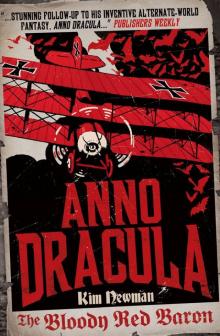 The Bloody Red Baron
The Bloody Red Baron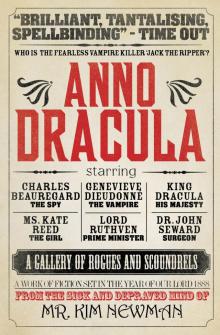 Anno Dracula
Anno Dracula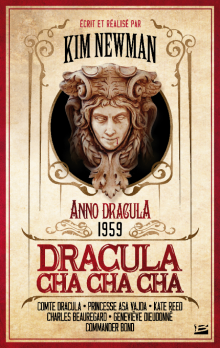 Dracula Cha Cha Cha
Dracula Cha Cha Cha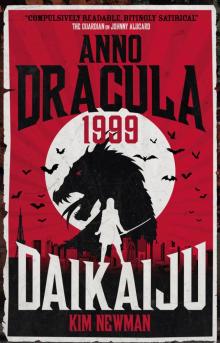 Anno Dracula 1999
Anno Dracula 1999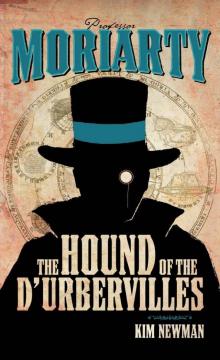 Moriarty: The Hound of the D'Urbervilles
Moriarty: The Hound of the D'Urbervilles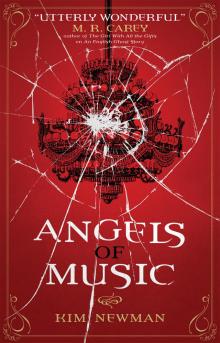 Angels of Music
Angels of Music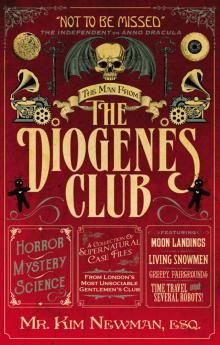 The Man From the Diogenes Club
The Man From the Diogenes Club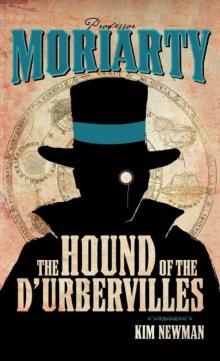 Professor Moriarty: The Hound Of The D’urbervilles
Professor Moriarty: The Hound Of The D’urbervilles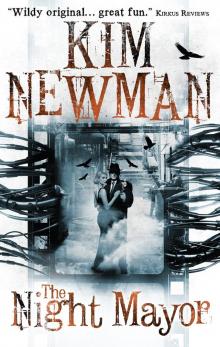 The Night Mayor
The Night Mayor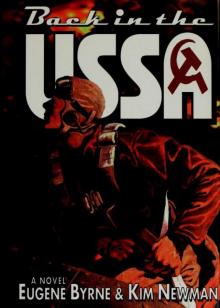 Back in the USSA
Back in the USSA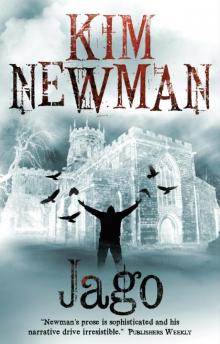 Jago
Jago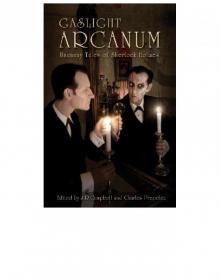 Gaslight Arcanum: Uncanny Tales of Sherlock Holmes
Gaslight Arcanum: Uncanny Tales of Sherlock Holmes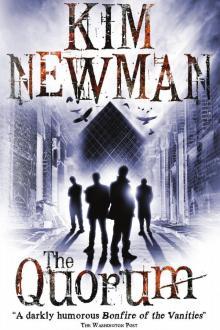 The Quorum
The Quorum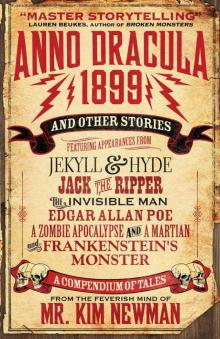 Anno Dracula 1899 and Other Stories
Anno Dracula 1899 and Other Stories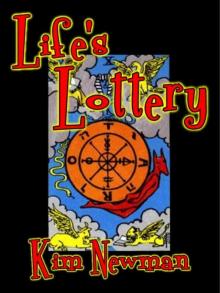 Life's Lottery
Life's Lottery The Secrets of Drearcliff Grange School
The Secrets of Drearcliff Grange School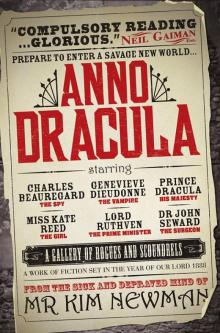 Anno Dracula ad-1
Anno Dracula ad-1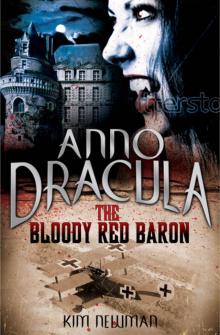 The Bloody Red Baron: 1918 ad-2
The Bloody Red Baron: 1918 ad-2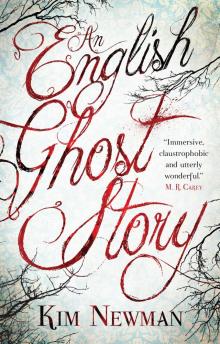 An English Ghost Story
An English Ghost Story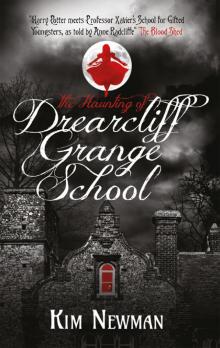 The Haunting of Drearcliff Grange School
The Haunting of Drearcliff Grange School The Other Side of Midnight
The Other Side of Midnight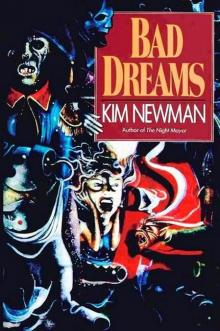 Bad Dreams
Bad Dreams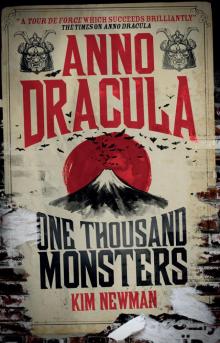 Anno Dracula--One Thousand Monsters
Anno Dracula--One Thousand Monsters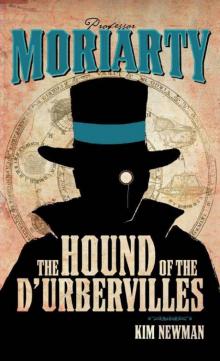 The Hound Of The D’urbervilles
The Hound Of The D’urbervilles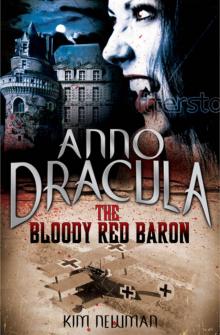 The Bloody Red Baron: Anno Dracula 1918
The Bloody Red Baron: Anno Dracula 1918